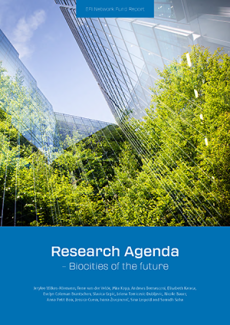Cities present some of our greatest challenges – they consume close to two-thirds of the world's energy, account for more than 70% of global greenhouse gas emissions and are rapidly growing. By 2050 more than two-thirds of the global population will live in urban areas. Additionally, global change to our (city) climate means it is urgent to transform our existing non-sustainable fossil-fuel based economy into circular bioeconomy. To do this means rethinking our cities in a holistic way by integrating rural and urban areas and promoting a co-creative, innovative and synergistic relationship between economy and ecology. Thus, we need to move towards sustainable, resilient, and healthy bio-based cities – Biocities.
In 2022, EFI launched the Biocities Facility to better connect science-based knowledge to policy and practice, and to unlock the potential of forest-based solutions in rethinking and co-creating sustainable, healthy and resilient cities, while leading the decarbonization of our society.
In support of the Facility the ReBio project was funded to develop a Biocities Research Agenda, which has identified knowledge gaps and specific topics and activities that could be addressed by the new Facility.
Research Agenda – Biocities of the future
The overall objective of the Research Agenda is to contribute towards transforming existing cities to Biocities and provide a framework for new urban developments. You can download the Research Agenda - Biocities of the future here.
Five key topic areas were identified as a framework for elaboration of a research agenda to facilitate the transition to Biocities: (1) circular bioeconomy, (2) climate resilience, (3) governance, (4) social and human environment, and (5) biodiversity. Various challenges arise from different perspectives in these topic areas, such as life-cycle management, cultural change, prioritisation of sustainable approaches, urban carbon storage, infrastructural adaptation, bioresilience, participation, cross-sectoral planning, systemic integration of health and wellbeing, and spatial sustainability.
The implementation of the Research Agenda will require five pathways: (i) an international coordinated research effort, (ii) interdisciplinary networks, (iii) integration of other initiatives, (iv) conceptual capacity building and (v) support for emerging disciplines. The implementation of the Research Agenda is expected to contribute to the Sustainable Development Goals in an urban context, as well as to support the Green Deal Strategy of the European Commission and the promotion of One Health.
Consortium
ReBio was a collaborative work of an interdisciplinary group of experts and scientists from the following organisations:
- Bern University of Applied Sciences (BFH), School of Agricultural, Forest and Food Sciences (HAFL),
- University of Natural Resources and Life Sciences (BOKU), Institute of Forest, Environmental and Natural Resource Policy
- University of Freiburg, Faculty of Environment and Natural Resources
- Karlsruhe Institute of Technology (KIT), Institute for Technology Assessment and Systems Analysis (ITAS)
- Delft University of Technology, Faculty of Architecture and the Built Environment, Research Fellowship Urban Forestry
- University of Belgrade, Faculty of Forestry, Department of Landscape Architecture and Horticulture
- Swiss Federal Institute for Forest, Snow and Landscape Research WSL
- Pan Bern AG
News about ReBio
Two consortia selected for Biocities call, EFI website 22.12.2020
Contact
For more information on the ReBio project please email the coordinator Dr. Jerylee Wilkes-Allemann, jerylee.wilkes(at)bfh.ch
